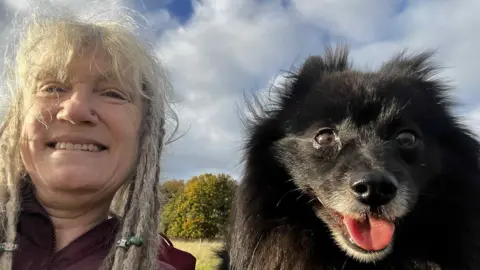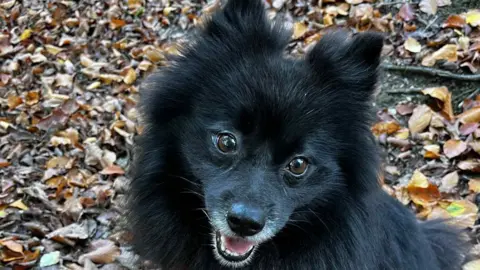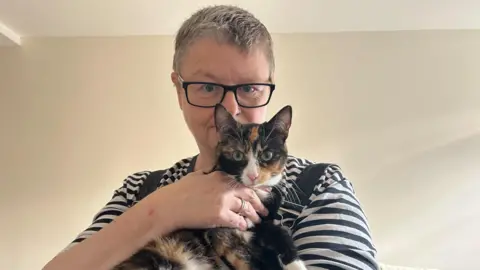
Kayleigh BarkerBBC Wiltshire
 Dee Terry
Dee TerrySome pet owners have said they have been forced to cut back on food amid rising vet bills.
Dee Terry from Durrington in Wiltshire had her German spitz, Bilbo, neutered last year – but the procedure led to an infection, leaving her with £1,200 in unexpected vet bills.
She said: “I paid it because otherwise he would have died, but it was a big shock.”
Francesca Verney, veterinary director at Pet People in London, said the reason vet bills have risen is largely down to equipment costs, adding: “It’s frustrating to be thought of as us having the wrong motivations, being driven by money.”
The Competition and Markets Authority (CMA) found that veterinary prices have risen by 63% over the past seven years, prompting its leaders to call for practices to be publish their fees.
Dr Rob Williams, president of The British Veterinary Association (BVA), supports the recommendations, adding it will help to increase trust.
 Dee Terry
Dee TerryTalking about Bilbo’s vet bill, Ms Terry said the unforeseen cost meant she had to cut back.
“I had to look more carefully at whether I was putting fuel in my car [and to] cut back on what I was eating,” she said. “And try to work out money to spread it out as far as I could.
“I’m disabled, and I keep a small cushion of money to pay for unforeseen expenses, like buying or replacing equipment or for ready prepared food for when I am too ill to cook from scratch.
“It comes out of my PIP, which is around £400 a month. It was that money that paid for the vet bill and it obviously left me short,” she said.
Another pet owner, Lucy Dawson from Salisbury said a five-minute trip to the vet with her kitten, Jessie, cost her more than £100.
After having Jessie spayed, Mrs Dawson found a wound and took her pet to the emergency vets.
“It took them no more than five minutes to do what they were going to do.
“When they came out, they said, ‘nothing wrong, she hasn’t broken the skin, but we’ve put a cone on her’…and then they charged £130,” she added.

The CMA found that there are no standardised prices for treatments, with 84% of vet practice websites providing no pricing information.
Chiefs at the organisation have proposed all vets should cap prescription fees and ban bonuses on offering certain treatments.
Ms Verney said the issue is not the fault of the vets, but rather is down to the expensive overheads they face.
“If we’re going to do a CT scan on a dog, that machine has cost me a quarter of a million pounds, plus the staff to run it safely,” she added.
Dr. Williams, from The BVA, said he believes vet bills will eventually go down as technology advances.
“The cost of the equipment will reduce over time. We’re on this tipping point with technology…there’s lots of talk about how artificial intelligence could come into play,” he said.







